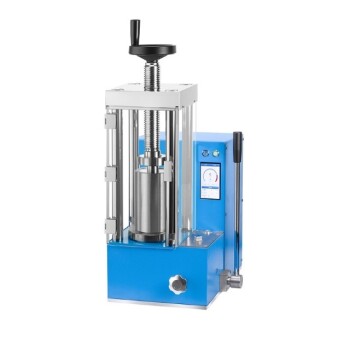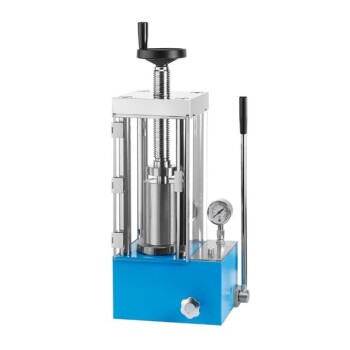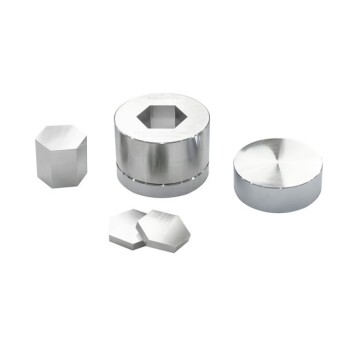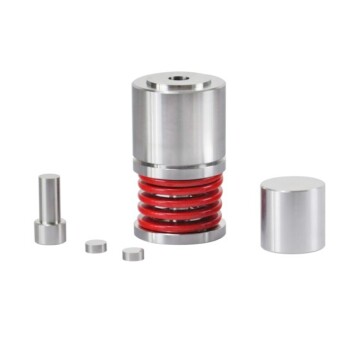In essence, Cold Isostatic Pressing (CIP) is used to compact powdered materials into a solid, uniform mass before final processing. It is the go-to method for creating large components, parts with complex geometries, or materials where uniform density is critical, such as in the aerospace, medical, and advanced materials industries.
The core value of CIP is its ability to apply equal pressure in all directions. This unique characteristic creates components with highly uniform density and strength, solving the common problems of weak spots, internal voids, and warping found in parts made with simpler, directional pressing methods.
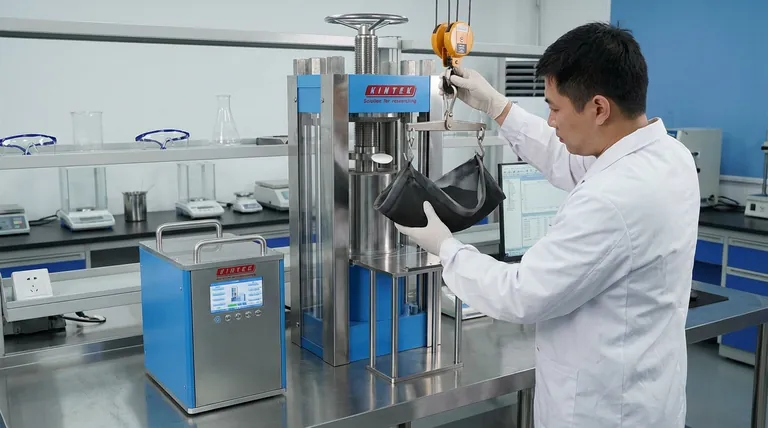
The Principle: Uniform Pressure for Uniform Density
Cold Isostatic Pressing is fundamentally different from traditional pressing, which applies force from only one or two directions. Understanding this distinction explains why it is chosen for high-performance applications.
How CIP Works
A powdered material is first sealed in a flexible, watertight mold. This mold is then submerged in a high-pressure fluid chamber. The fluid is pressurized, exerting equal force on every surface of the mold, which compacts the powder inside.
The Critical Outcome: Uniform Density
Because pressure is applied from all sides simultaneously (isostatically), the powder compacts evenly throughout the entire volume. This eliminates the density variations, internal stresses, and potential weak points common in parts made with uniaxial (top-down) pressing.
The Advantage: High Green Strength
The resulting compacted part, known as a "green" compact, has exceptional strength before it undergoes final hardening (sintering). This allows it to be safely handled, transported, and even machined, significantly reducing production defects and costs.
Key Applications by Industry and Material
CIP's ability to produce large, complex, and uniform parts makes it indispensable across several advanced manufacturing sectors.
Powder Metallurgy and Advanced Ceramics
This is a primary application area. CIP is used to form high-integrity parts for demanding environments, such as components for aerospace engines, medical implants, and automotive valves. Its ability to create complex shapes with predictable shrinkage during sintering is invaluable.
Sputtering Targets and Industrial Components
The technology is used to produce large, dense sputtering targets, which are essential for creating thin film coatings in the electronics and semiconductor industries. It is also used for creating large billets of materials like refractory metals and graphite that are too big for conventional presses.
Specialized and High-Stakes Fields
CIP is trusted in sectors where material failure is not an option. This includes forming parts for nuclear fuel assemblies, chemical processing equipment, and even components for military and defense systems, where reliability and uniform strength are paramount.
Understanding the Trade-offs
While powerful, CIP is not a universal solution. It is a specialized process chosen to solve specific challenges.
Precision vs. Preform
CIP is not known for producing parts with high dimensional accuracy right out of the press. The flexible mold does not provide the tight tolerances of a rigid steel die. Therefore, CIP is often used to create a "near-net shape" preform that has excellent density and strength but will require final machining to meet precise specifications.
When to Choose CIP Over Uniaxial Pressing
Uniaxial pressing is faster and cheaper for simple, relatively small shapes like tablets or basic cylinders. CIP becomes the superior choice when the part is too large for a conventional press, has a high aspect ratio (long and thin), or features complex geometry that would lead to cracking or density gradients with one-directional pressure.
Cost and Cycle Time
CIP can be more cost- and time-efficient for one-off or low-volume production of large and complex shapes because the flexible tooling is much cheaper to create than a dedicated hard steel die set.
Making the Right Choice for Your Goal
Selecting the correct manufacturing process depends entirely on the requirements of your final component.
- If your primary focus is producing large or long parts: CIP is the ideal method, as it is not constrained by the physical size limitations of a mechanical press die.
- If your primary focus is a complex geometry: CIP ensures uniform compaction, preventing the cracks, voids, and distortion that plague complex shapes made with other methods.
- If your primary focus is absolute material integrity: CIP delivers the uniform density and strength required for high-performance applications in aerospace, medical, and energy.
- If your primary focus is creating a strong preform for later machining: CIP excels at producing a homogenous "green" part that can withstand handling and machining before final sintering.
Ultimately, you choose Cold Isostatic Pressing when the uniformity and structural integrity of your component cannot be compromised.
Summary Table:
| Key Aspect | Details |
|---|---|
| Primary Uses | Compacting powdered materials for large, complex parts with uniform density in aerospace, medical, ceramics, and electronics industries. |
| Key Advantages | Equal pressure in all directions, elimination of weak spots and voids, high green strength for handling and machining. |
| Ideal For | Large components, complex geometries, materials requiring uniform density, and preforms for later processing. |
| Limitations | Not for high dimensional accuracy; parts often require final machining; slower and costlier for simple shapes compared to uniaxial pressing. |
Need reliable Cold Isostatic Pressing solutions for your lab? KINTEK specializes in lab press machines, including isostatic presses, to help you achieve uniform density and high-strength parts for demanding applications in aerospace, medical, and advanced materials. Contact us today to discuss how our equipment can enhance your production efficiency and material integrity! Get in touch now!
Visual Guide

Related Products
- Electric Split Lab Cold Isostatic Pressing CIP Machine
- Electric Lab Cold Isostatic Press CIP Machine
- Automatic Lab Cold Isostatic Pressing CIP Machine
- Manual Cold Isostatic Pressing CIP Machine Pellet Press
- Automatic Laboratory Hydraulic Press Lab Pellet Press Machine
People Also Ask
- How does CIP improve the mechanical properties of refractory metals? Boost Strength and Durability for High-Temp Applications
- How is cold isostatic pressing used in complex-shaped component production? Achieve Uniform Density for Intricate Parts
- What are the advantages of Cold Isostatic Pressing (CIP) for pellet preparation? Achieve Superior Density and Uniformity
- What are the common forming processes in advanced ceramics? Optimize Your Manufacturing for Better Results
- What is Cold Isostatic Pressing (CIP) used for? Achieve Uniform Density in Complex Parts

